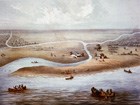Historian Doug Kiel explores the dramatic changes to Indian Country following the War of 1812. If Native aspirations were to maintain their land base and relative autonomy, then the war was most of all a loss for Native peoples throughout eastern North America.
-
Article 1: The Fight for Native Self-Determination

Indian country was never the same following the War of 1812. If Native aspirations were to maintain their land base and relative autonomy, then the war was most of all a loss for Native peoples throughout eastern North America. This is most clearly evident in the Great Lakes region. Read more
-
Article 2: Re-drawing the Line: American Agriculture Buries Native Alliances

Following the conclusion of the War of 1812, alliances with American Indians became more complicated. While some tribal groups still traded and maintained a relationship with British and Canadian allies from during the war, others felt betrayed by the lack of a provision in the Treaty of Ghent establishing boundaries for tribal lands. Shifting economies also put less importance on Native trading partners, emphasizing instead agriculture and industry. Read more
-
Article 3: American Expansion Turns to Official Indian Removal

Euro-Americans were more interested in settled agriculturethan they were in sustaining the fur trade that had characterized the region for more than a century. Americans aggressively pushed Indians to become virtually indistinguishable from themselves, or failing that, to relocate them from areas of American settlement altogether, a political development that came to characterize US relations in the 1800s with Indian nations westward all the way to the Pacific. Read more
-
Article 4: Hidden in Plain View: Native Strategies of Resistance to Indian Removal

As Indian Removal became the law of the land, tribal groups had few choices of how to navigate this. They could comply and either be sent off to reservations out of the way of white expansionism or try to assimilate into white society as best they could, or could defy the ruling and continue to fight for territory. The reactions among tribal people covered all ends of this spectrum. Read more
